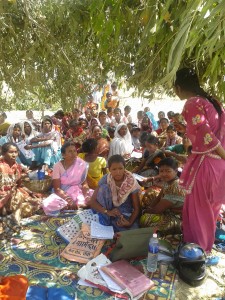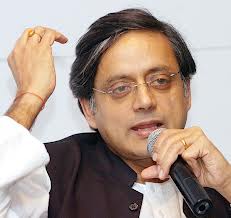Where would it have happened that an unknown person from Jharkhand could question the Union minister of Education? We made this possible through our technology. Download our case study on education campaign conducted by OurSay in partnership with Gram Vaani. Read excerpts below.

In our everyday lives we see our things that bother us, things that we feel aren’t right, things that need to change. But then, silently retire the concern and accept reality the way it is thinking ‘What can I do, it’s not in my hands.’ We often find the word “people” missing from our democracy. In the Government led systems our problems, views, opinions are lost somewhere as and we become quite when no one’s listening.
 The advent of social media has changed this trend dramatically as more and more people have started raising their voices and are demanding a change. Social media has empowered the common man of urban India. However, this demography constitutes just a drop in the sea as 80 % of India’s population lives in villages which is partitioned by digital divide. Rural India, beset by illiteracy, poverty and lack of mass media and internet is alienated to social media.
The advent of social media has changed this trend dramatically as more and more people have started raising their voices and are demanding a change. Social media has empowered the common man of urban India. However, this demography constitutes just a drop in the sea as 80 % of India’s population lives in villages which is partitioned by digital divide. Rural India, beset by illiteracy, poverty and lack of mass media and internet is alienated to social media.
Even though through social media urban India is able to raise voice and share their views with one another, how often do we get an opportunity to question our ministers and Government directly let alone for rural India? Never could an unknown layman from rural Jharkhand ever imagine putting up a question directly to the Union Education minister and get an answer.

We wanted that public views are considered in functioning and policy making of Government and that our voices are heard and responded by the authorities. To make this a reality OurSay in partnership with Gram Vaani, organized an education campaign to solicit public views about the Future of higher education. OurSay is a social media platform in Australia that enables public debate with the leaders
The education campaign was run for 6 days in the last week of April. In the campaign on Mobile Vaani platform in Jharkhand, we invited public to record questions they would like to ask the Minister for State, Human Resource and Development, Shashi Tharoor. Hundreds of people from different districts of Jharkhand called in to Mobile Vaani to record questions that they wished to ask the minister. Questions on multiple issues in the education sector were raised on Mobile Vaani.
The questions pertained to varied domains of education such as Policy framework, linguistic enquiry, system for special cases, Right to education, commercialization of education, International university standards of brain drain and, infrastructure of the school.
Read and listen to the questions asked:
http://voice.gramvaani.org/vapp/mnews/10/show/detail/44550/
Global perspective on Quality of higher education in the country
“Why doesn’t even a single Indian University figure in World’s Top 100?”
Khushi Prasad, 28 years, from Baghmara Block, Dhanbad called up to ask the reason behind no Indian University being able to secure a place in World’s Top 100 Universities. He further cited a survey carried out by the Time Magazine about Asia’s top 25 Universities where Tokyo University occupies the first position. He expressed his disappointment on no Indian university being able to make it to one of the top 25 spots figured there. In light of these depressing facts he questioned Dr. Tharoor about the reasons for no Indian University being able to make it to the top spots, casting serious doubts on the credibility and quality of higher education in the country.
Commercialization of education
“RTE: Where will children go after class 8th?”
Janardan Mahto, 43 years, Baghmara Block, Dhanbad called up to ask that the government has adopted dual faced policies in the regard of education. Firstly according to RTE compulsory education can only be availed of as a right, until class eight. On one hand there are the Government schools where quality of education is very poor and on the other hand there are private schools designed for the wards of rich families which take good care of the education of the students paying huge fees. All of us are aware of the attitude of Private schools regarding the intake of students from poor families. May I ask Dr. Tharoor, why such discrimination has been given a green flag, when both the poor and the children from rich family has equal rights to get quality education under Right to education Act? Are the children of poor lesser citizens of this country?
Widespread Corruption in Education system
“Education system in acute crisis…”
Jai Prakash Singh from Sarath block, Deoghar district called up to report about the deteriorating quality of education in Jharkhand. According to him, even after twelve years of Jharkhand being granted statehood, no concrete changes have been seen in the education system of the state. The quality of teaching staff in Government schools has remained the same, if not deteriorated, through the last decade. He shared his concern for the widespread corruption in the education system and few powerful from the Government corridors framing policies, least cared about the welfare of the people at the bottom line. He concluded the message by requesting Dr. Tharoor to set up immediate enquiry into such irregularities in the education system.
 English speaking skills required
English speaking skills required
“English a necessity in the Globalized World…”
Parmeshwar Kumar Chauhaan, 23 years, Dhanbad and Rupak Mahto, 32 years, Kherabera Village, Topchanchi, Dhanbad says that English is an international language which is required at every step in the globalized world. However, all the government schools of Jharkhand are Hindi medium and there is no facility for the students to inculcate good english reading, writing and conversation skills. Since, it is the right of the children to get quality education that helps them make progress and move ahead in this competitive world, he questions Dr. Tharoor, asking him how he is planning to overcome this challenge. He concludes by saying that as most of the Indian population resides in the rural areas, if we have to make the Indian education system a world class education system, this is the one of the very important questions that we need to answer.
Teacher absenteeism and Poor Infrastructure
“Quality of Education in Government Schools…”
Ashok Azaad, 37 years, Tupkadih, Bokaro and Arvind Prasad Khushwaha, 30 years, Doranda village, Dhanwar block, Giridih district called to ask that what can be done to improve the infrastructural situations and quality of education in the government schools (middle and high schools), in hard to reach rural areas the teacher to student ratio is even lower than 1:200? There are no proper facilities for doing practicals and the contractual teachers are most of the times on strike, demanding permanency and wage hikes. The teachers are most of times distracted by the other government schemes such as mid-day meal or census election duties that the studies of children suffer. What can be done to control this?
http://voice.gramvaani.org/vapp/mnews/10/show/detail/44550/

From a host of questions, two best were chosen to be asked by Oursay. Oursay posed the two chosen questions to Shashi Tharoor which he answered over Google Hangout on 9th of May.
To see the video, please click here.
Read the two questions asked and their answers given by Shashi Tharoor, below:
 Parmeshwar Kumar Chauhaan, 23 years, Dhanbad/ Rupak Mahto, 32 years, Kherabera Village, Topchanchi, Dhanbad
Parmeshwar Kumar Chauhaan, 23 years, Dhanbad/ Rupak Mahto, 32 years, Kherabera Village, Topchanchi, Dhanbad
English is an international language which is required at every step in the globalized world. However, all the government schools of Jharkhand are Hindi medium and there is no facility for the students to inculcate good english reading, writing and conversation skills. Since, it is the right of the children to get quality education that helps them make progress and move ahead in this competitive world, how do you think this challenge can be overcome? As most of the Indian population resides in the rural areas, if we have to make the Indian education system a world class education system, this is the one of the very important questions that we need to answer.
Shashi Tharoor : While there is a lot of discussion suggesting the power of grasping concepts easily in one’s own language but in the globalized world English is indeed necessary. If young Parmeshwar wants to study in an institution such as JNU it would be next to impossible for him to sit through the lectures. On the other hands, the professors are not accustomed to taking classes in Hindi, so there is a complete mismatch. This is a very relevant point raised by Parmeshwar because in the rural areas english is indeed poorly taught. We really need to look into this aspect.
Ashok Azaad, 37 years, Tupkadih, Bokaro/ Arvind Prasad Khushwaha, 30 years, Doranda village, Dhanwar block, Giridih district
What can be done to improve the infrastructural situations and quality of education in the government schools (middle and high schools).In hard to reach rural areas the teacher to student ratio is even lower than 1:200? There are no proper facilities for doing practicals and the contractual teachers are most of the times on strike, demanding permanency and wage hikes. The teachers are most of times distracted by the other government schemes such as mid-day meal or census or election duties that the studies of children suffer. What can be done to control this?
Shashi Tharoor – It is true that the rates of teacher absenteeism in India are very high. It is unfortunate and a punishable act, I highly condemn this. To say that the teachers abandon their teaching duties to help with mid day meals should not be done. There is a separate component for mid day meal cooks and helpers and if teachers are using this as an excuse not to teach in class, it should not be done. And to say that teachers are given election duties, elections come once in 5 years, that’s a fair demand from the democracy because in most of the rural areas schools are used as polling booth. Care is taken that elections don’t clash with examinations.



